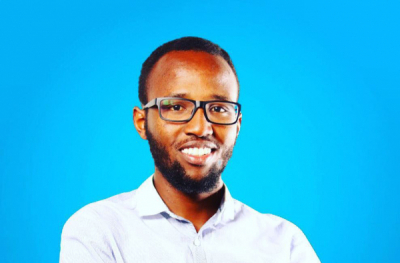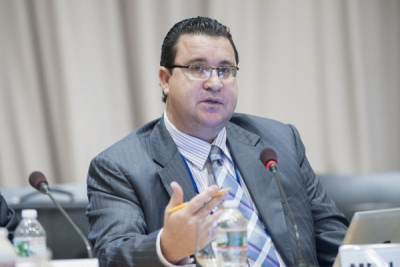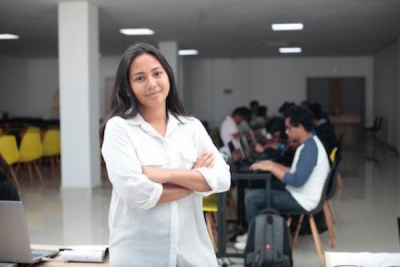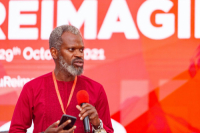With his over seven years of entrepreneurship experience, Aminu Ibrahim Bakori successfully entered the fintech segment by offering solutions to a crucial problem faced by businesses: card issuance. His startup developed an API that allows businesses and individuals to issue payment cards within days instead of the usual weeks or months waiting times that are the standards with banks.
In January 2021, Aminu Ibrahim Bakori (photo, right) and Kabir Shittu (photo, left) founded fintech startup Sudo Africa in Nigeria. Barely 18 months after its launch, in March 2022, the startup came under the spotlight by raising US$3.7 million in pre-seed funding. During the funding round, participating investors included notable names like Global Founders Capital Picus Capital, LoftyInc Capital, Rallycap Ventures, Kepple Africa, Berrywood Capital, ZedCrest, and Suya Ventures.
With the proceeds of that round, Sudo Africa plans to consolidate and develop its operations. The startup offers an API enabling the quick issuance of virtual and physical payment cards in Nigeria. It was founded to reduce the always long-waiting of firms and businesses that want to issue payment cards for their staff or clients.
“At some point, we wanted to issue cards and worked with one of the local banks in Nigeria. (...) They got to print up to 1,000 cards, but it took a lot of time and none of them functioned because the bank wasn’t able to provide any APIs for us to either manage the cards or even control the usage of those cards. That was the first time we came around, thinking about how to issue cards,” explains Sudo Africa’s co-founder and CEO Aminu Bakori.
The young entrepreneur holds a BSc in Statistics from Ahmadu Bello University (2015). He presents himself as “a passionate computer science student, programmer, and developer” who loves “ developing web applications and windows html5 apps, (...) Microsoft technologies and teaching others how to use technology for good use.”
In 2013, while still at university, he founded Friendstie, a social network for tech enthusiasts. Some four years later, he founded Payant.ng, a startup offering SMBs and freelancers the means to issue invoices, send payment reminders, and collect payment directly into their bank accounts wherever they are.
Melchior Koba
Agriculture is the cornerstone of several economies in Africa. Yet, the sector is underexploited. With the emergence of innovative digital solutions, hopes are high that the agriculture sector will actively contribute to development on the continent.
Apollo Agriculture is a Kenyan startup founded in 2016 by Benjamin Njenga, Earl St Sauver, and Eli Pollak. Through its digital platform, accessible through an android app only, it allows farmers access to inputs, funding, and previously inaccessible markets.
It aims to help its users maximize their profits. Since its creation, the startup has completed several funding rounds, totaling US$52.2 million, to upgrade its technology and support growth.
“We are continuing to invest in growing faster; serving more farmers, helping them increase their acreage, and speeding up business. And So it will be a continued expansion in both Kenya and new markets,” said CEO Eli Pollak.
To access the services offered by Apollo Agriculture, farmers must register through the android app, and provide information including their marital status and their cultivated areas. After that step, Apollo Agriculture collects satellite imagery of the farms and uses artificial intelligence to estimate solvency and machine learning to make better decisions concerning the loans that can be granted to a specific farmer.
The startup claims over 100,000 farmers, more than a thousand retailers, and 5,000 agents, who operate across the country to attract farmers even from the most remote areas. For 2022, its ambition is to double the number of farmers in its portfolio.
Adoni Conrad Quenum
In his about one decade of entrepreneurship experience, Tesh Mbaabu has implemented several projects in Kenya. With his numerous national and international recognitions, he has won the trust of investors ready to support the East and West African expansion of his B2B platform.
Tesh Mbaabu (photo) is a Kenyan entrepreneur and co-founder of MarketForce, a B2B platform that facilitates the retail distribution of consumer goods and digital financial services in Africa. In 2020, the platform he co-founded with Mesongo Sebuti was improved with the integration of RejaReja, which allows users to make orders, pay, accept payments, and access online loans.
About two years later, in February 2022, MarketForce raised US$40 million to enter new East and West African markets in addition to Uganda, Tanzania, Rwanda, Nigeria, and Kenya.
Its co-founder and CEO is a serial entrepreneur. He quicked off his professional career in 2011, four years before his BSc in computer science from the University of Nairobi (2015). That year, he became the creative director of Tesh Technologies Ltd, a graphic design and printing firm, while attending university. Two years later, he co-founded Mesozi Group, an integrated business and technology solutions provider. In 2016, Tesh Mbaabu co-founded Cloud9xp.com, an online recreation marketplace, and booking platform. About one year after the creation of MarketForce, he joined traveltech startup HotelOnlline as a board advisor.
His digital entrepreneurship experience also earned him prestigious recognitions. In 2018, he was a mentor at iHub Nairobi's Traction Camp, a “regional acceleration program aimed at nurturing startups in East Africa.” Three years later, he became an entrepreneurial growth mentor for accelerator JASIRI. Since April 2022, he has been teaching Entrepreneurship Without Borders (MS&E 272) at the University of Stanford, California. On April 21, he received the Fintech Investment Excellence Award during the Africa Fintech Summit in Washington DC.
Melchior Koba
During the COVID-19 lockdown period, 79% of Ghana’s retail business was carried out online. The growth of this innovative means has attracted scammers. The program announced is aimed at weeding them out of the segment.
Ghana’s Postal and Courier Services Regulatory Commission (PCSRC) announced Tuesday (April 26) the upcoming registration of e-commerce and logistics operators.
The program aims to create a secure online profile for the said operators to “root out” frauds and scams in that booming segment.
According to an official release signed by PCSRC executive secretary Hamdaratu Zakaria (photo), “a free-to-use electronic portal has already been developed to enable (...) the public to obtain directory information on all registered e-commerce traders and logistics companies (including courier services) in good standing with the PCSRC before doing business with them.”
The announcement comes days after the publication of an investigation by a local media, The Fourth Estate. According to the non-profit media launched by the Media Foundation for West Africa (MFWA), crooks are forging the documents of duly registered companies to scam unsuspecting buyers. They also swindle goods worth millions due to clients’ inability to verify the authenticity of the documents they are presented.
For the PCSRC, the registration program will rid the segment of those shady practices at a time when domestic regulation is “complicated” by the “ongoing trade liberalization regime under the AfCFTA and ECOWAS.” The local platform is also integrated with the AfCFTA’s African Trade Gateway, a digital platform that provides market and due diligence information about counterparties. That way, Ghanaians can get information on whether foreign operators are legit or not while foreigners will avoid being scammed by selected legit Ghanaian operators.
The PCSRC release explains that in the future, the agency will work with other Ghanaian institutions to root out digital fraudsters wherever they operate.
According to conservative estimates by the Ghana E-Commerce Association, the country’s e-commerce market will grow from US$481 million in 2021 to US$674 million in 2025. Its size will also grow to 11 million users by that time.
Ruben Tchounyabe
Since 2020, most African governments are set on digitizing strategic sectors, including the public service. Within two years, Ghana, which has become one of the digitally-advanced countries, raised US$315 million for that purpose.
The World Bank approved, Thursday (April 28), a US$200 million loan to accelerate digital transformation in Ghana with a new project dubbed Ghana Digital Acceleration Project. The funding was announced in the same release published on the institution’s website.
According to the release, it will help “increase broadband access, enhance the efficiency and quality of selected digital public services, and strengthen the digital innovation ecosystem in Ghana to help create better jobs and economic opportunities.”
For Pierre Laporte (photo), World Bank Country Director for Ghana, Liberia, and Sierra Leone, “expanding digital access and adoption, enhancing digital public service delivery, and promoting digitally-enabled innovation is essential for Ghana’s digital transformation, which will help drive a robust post-COVID-19 recovery.”
Likewise, for Maria Claudia Pachon -Senior Digital Development Specialist of the World Bank and Task Leader of the new Project- the digitization of public services will “result in significant cost savings due to decreased travel and processing time to obtain services, as well as transaction costs such as manual entry errors, fraud, and corruption.”
The Ghana Digital Acceleration Project builds on the ongoing e-Transform Ghana project, which allows Ghana to become one of the most digitally advanced countries in Africa. In its latest report on the e-government development index, the International Telecommunications Union (ITU) ranked Ghana the fifth in Africa, in 2020. At the same time, the country jumped from being the 143rd out of 193 countries worldwide in 2004, to the 101st place in 2020.
The new digital acceleration project supports regulatory change to create an environment that facilitates access to mobile and broadband internet for six million people, in underserved rural areas notably. It will also favor the digital inclusion of women and people with disabilities, enhance the local digital entrepreneurship ecosystem, improve startups’ growth and survival rate, facilitate smallholders’ involvement in data-driven agriculture and promote advanced digital innovation skills.
Muriel Edjo
The online training platform has already convinced several investors with its innovative model. Its ambition is to enter new African markets and prepare millions of residents for the digital economy.
Malagasy start-up Sayna raised, Thursday (April 28), US$600,000 from Orange Ventures, Launch Africa Ventures, and MAIC Investors Club, to develop its operations.
The startup created Sayna Academy, a computer skills training platform, and Sayna Works, a micro-task platform. With the funds raised, it wants to upgrade its platforms to be able to host 257,000 microtasks and attract more than 3,000 active freelancers and 12,000 learners by 2024.
In 2021, its founder, Matina Razafimahefa, unveiled the startup's plan to enter the Ivorian, Ghanaian and Senegalese markets.
“This fundraising is both a crucial step for SAYNA’s international development and a strong symbol for the Madagascar tech scene. Our team is today composed of 25 people split between France and Madagascar. This is also a sign of hope for hundreds of thousands of young African talents who, until now, have not had the opportunity to become professionals to take advantage of the fourth industrial revolution underway on the continent,” she said commenting the fundraising.
Sayna was founded in 2018 and quickly attracted ambitious young people looking to acquire soft skills to improve their living conditions.
For Zach George, managing partner of Launch Africa Ventures, “Sayna, with its focus on soft skills training, mentorships, and a peer-to-peer learning environment, stands a good chance of becoming a direct gateway to projects, experience, and income for youth across the African continent.”
In 2021, the startup obtained over US$105,000 from I&P Acceleration Technologies, a program that funds startups in sub-Saharan Africa thanks to support from the French Development Agency (AFD), through the Digital Africa Initiative. To date, it claims 450 learners trained and over 609 corporate partners and clients served.
Muriel Edjo
In just two years, serial entrepreneur Jesse Ghansah transformed Float into a promising fintech startup now trusted by several investors.
In January 2022, Ghanaian fintech Float raised US$17 million, a comparatively high amount raised by an African startup for its expansion. During the funding round, the startup co-founded in 2020, by Jesse Ghansah (photo, right) and Barima Effah (photo, left) seduced notable investors like Tiger Global, JAM Fund, Cauris, Kinfolk, Soma Capital, Ingressive Capital, and Magic Fund. Several angel investors also contributed. With the proceed, the startup plans to enter the South African and Kenyan markets.
Through Float, Jesse Ghansah helps small and medium businesses manage and monitor their cashflows in real time, pay supplier debts, and access loans for critical business expenses.
“Businesses that serve other businesses have to wait typically for 30-90 days for their payments to come in. This is like a traditional payment cycle where you have to offer credit sales to your customers to stay competitive. that’s why you send an invoice, and the customer will pay you back within that time frame,” he indicates.
According to Techcrunch -quoting a UN research report-, “85% of African SMBs have zero access to financing, and each day, African SMBs have billions locked up in receivables due to long payment cycles.” They, therefore, face cash flow problems that prevent them from paying for important expenses and delivering orders on time.
Float is created to address such problems, Ghansah explains. The loans granted through Float help address the liquidity problems that could be caused by late client payments. Firms also have no worries about paying salaries when their cash flow is tight. They can seamlessly repay the received loans when all the clients pay their invoices.
Jesse Ghansah graduated from Kwame Nkrumah University of Science and Technology, in 2014, with a BSc in Biochemistry, Biotechnology, and Molecular Medicine. The same year, he quicked off his entrepreneurial career by co-founding the e-commerce platform Swipe Commerce and Zita Cakery. In 2015, he founded OMG Digital, the media company that owns OMGVoice and Bitnode. He also created Hivegig, the first Ghanaian online freelance marketplace that connects individuals and companies with freelance workers.
To ensure the success of Float, from 2019 to 2020, he upgraded his machine learning and artificial intelligence skill at the Bloom Institute of Technology, also known as BloomTech.
Melchior Koba
Jonh Kamara created his platform to save millions of Africans from his painful experience. The platform aimed at helping reduce misdiagnosis cases in Africa earned him the confidence of several investors, who have committed funds for his expansion phase.
Tech veteran John Kamara (photo) is the founder of AfyaRekod, a healthtech combining artificial intelligence and blockchain technology to store users’ health information. With 20 years of professional experience in various fields like gaming, e-commerce, and telecommunications, the Kenyan entrepreneur is now committing his expertise and energy to guarantee better healthcare for patients across Africa.
In fact, he created AfyaRekod in 2020, following the demise of one of his close friends in Lagos, Nigeria. “...My friend was diabetic. But that wasn’t enough to kill him. He was rushed to the hospital with a seizure, and the doctors treated exactly what they saw. They were blindsided because they had zero idea of everything that happened before he got there,” Kamara told TechCabal explaining the origin of his platform.
His platform collects and securely stores users’ health data. That way, anytime those users are taken to a hospital, doctors can check their health history via the AfyaRekod app or a USSD code for informed decisions.
In February 2022, the startup raised US$2 million from notable investors, including Japanese Next Chymia, to upgrade its product offering and enter new African markets.
Apart from the health industry, John Kamara is also active in the gaming industry. In 2020, he co-founded ADA Animation, with Joy Mwangi. Through ADA Animation, the aim is to “build capacity in the animation industry, tell animated African stories and catalyze the animation industry for growth.”
He began his professional career as director of business development of the US tech firm Sun Microsystems. From there, he went on to become director of strategy for Google. He also served many internationally renowned firms on several continents. From 2014 to 2018, he served as the Director of Digital Growth & Development for Global Gaming Africa. He is currently the Director of Strategy at the Data-Driven Innovation Center at the Nelson Mandela African Institute for Science and Technology (NM-AIST).
Melchior Koba
The coronavirus pandemic forced several African startups to overhaul their business model to survive. Though forceful, the overhaul was beneficial for most of them. For instance, from a simple ride-hailing app, Gozem has grown to become one of the well-known African super-apps.
Gozem is a Togolese startup, with main offices in Togo and Singapore, founded in 2018 by Emeka Ajene, Gregory Costamagna, and Raphael Dana. Through its eponymous platform, it offers ride-hailing, e-commerce, logistics, and financial services.
Users can access all of the services it offers, in one click, through the app available on PlayStore and AppStore. They can hail a bike, book a taxi or a 3-wheeler, order food from various restaurants or buy groceries. The services can be paid using cash, mobile money, or bank cards. Gozem also integrates a digital wallet that can be loaded using mobile money to pay for the services and orders. “What we’re trying to offer is an integrated wallet solution that is included in a suite of different services,” explains co-founder Gregory Costamagna.
From its creation to date, the startup has completed several funding rounds raising a total of US$1.7 million for its expansion in Francophone African markets, Benin, Gabon and Cameroon notably.
In December 2021, it was claiming over 250 staff, close to 800,000 registered users, and over five million trips booked on its markets. Its ambition is to expand further in Francophone Africa by entering the Democratic Republic of Congo, Senegal, and Côte d’Ivoire.
“Where we operate on the continent is kind of what some might call second-tier African markets. But we have an opportunity and believe in the model we’re pursuing. It’s really a wide berth where there’s lesser competition, as discussed across all our verticals. While we are operating in four countries, we want to be embedded across the region over the next year,” Ajene indicates.
Adoni Conrad Quenum
Artificial intelligence and machine learning are important tools to improve the efficiency of digital solutions. They are now used by a growing number of African startups.
In 2021, Nour Altaher and Omar Mansour co-founded Egyptian market research startup Intella, a startup that uses artificial intelligence, machine learning, and big data to improve business insights. Through its cloud-based platform, the startup allows firms to create quick custom surveys, run online focus groups and use data to optimize their brand performance.
In March 2022, Intella raised US$1 million to attract new talents, improve its platform and develop new analytics tools. According to co-founder and CTO Omar Mansour, “Intella is a real technological innovation, offering predictive machine-learning and analytic models based on new pattern discovery and big data, which has proved to be of unparalleled value for companies aiming at making informed decisions, and meeting the needs of their customers promptly.”
It can therefore be used by government entities, financial institutions, startups, or even SMEs planning to launch new products. The platform collects real-time information from its online communities of students, techies, millennials, and single mothers. Thanks to the diversity of its community and its specific algorithms that assess the quality of the answers given by each of the surveyed, the platform improves the quality of surveys it spearheads.
Currently, Intella’s services are only available through its web platform. To launch a new project, users just have to visit its website, provide a set of information like the nature of the project, the target country, and sector and leave Intella to handle the rest. Its pricing depends on several parameters like the type and size of the audience and the project duration.
Adoni Conrad Quenum
More...
Within four years, he was able to position FedaPay, the startup he co-founded, in several African markets. His ambition is to conquer the whole African market.
Benin-born Hermann Aguessy (photo) is since January 2022, the CEO of FedaPay Niger, the Nigerien subsidiary of the startup he co-founded five years ago with Boris Koumondji.
The startup, which offers payment aggregation solutions, is already present in several African countries, including Benin, Togo, Côte d'Ivoire, and Senegal. However, its aim is to improve its offers and boost financial inclusion in the continent. It intends to first cover the whole of Francophone Africa, by entering additional markets like Burkina Faso and Cameroon.
With its eponymous solution, FedaPay aims to offer clients a handy tool, the only one they will need to collect payments.
“Users can now accept Visa, Mastercard, and mobile money payments through FedaPay. The platform can be useful for -commerce actors and everyone accepting payment online or through mobile/web apps,” Hermann Aguessy said in January 2022 after raising expansion funds through the Benin Business Angel Network (BBAN).
In 2012, the co-founder completed his Master’s of Computer Science at the University of Abomey-Calavi, Benin, and joined the International Organisation of la Francophonie as an IT manager. A year later, he co-founded tech lab BLOLAB while at the same time pursuing an IT service management certificate at the ITIL Foundation.
In 2014, he returned to Benin as head of the IT department of Polytechnic School of Abomey-Calavi (EPAC). Months later, he founded Nautilus Technology, a computer engineering firm, and held management position (until 2018) at DUCIEL Sarl, an international trading firm.
With FedaPay, Hermann Aguessy earned several government recognitions. In May 2021 for instance, he received a XOF23.4 million (US$38,000) grant from Benin’s Digital Entrepreneurship Support Fund. His startup has also been commissioned by the National Agency for the Identification of Persons (ANIP) to collect payments for its services.
Melchior Koba
With the digital library created, Moroccan authorities want to encourage reading and contribute to the development of new skills.
The Moroccan Ministry of Youth announced, Monday (April 25) the creation of a digital library with more than 36,000 books, freely accessible to every citizen. The books are categorized by age group and subject. Every week, the digital library will be updated with new books published by more than 400 authors, we learn.
According to the Ministry, the library is created to diversify the digital services offered by media libraries and contribute to the vulgarization of new information technology standards in the publishing sector.
With its digital library, the country wants to encourage the population to read, learn and acquire new skills. They can access it anywhere they are. As for users of media libraries and cultural centers supervised by the Ministry of Youth, they will receive a username and password to visit the digital media library anytime they are within the premises of those cultural centers.
The digital library is launched just days after World Book and Copyright Day (April 23) and just weeks before the national reading day (May 10).
In 2019, the Morrocan High Commission for Planning (HCP) revealed that only 0.3% of the Moroccan population read daily and the average daily reading time is two minutes. The HCP also stressed that 55% of the young population have never read a book while 33.8% reads occasionally and 11.2% read regularly.
Ruben Tchounyabe
In the past ten years, Morocco invested heavily in the implementation of its digital transformation strategy. With the experience and expertise of its new DCO partners, the country expects to bridge the gaps still remaining in its strategy.
The Digital Cooperation Organization (DCO) announced, Tuesday (April 26), Morocco’s membership in the organization. The constitutive act was signed by Mustapha Mansouri (photo), Moroccan ambassador to Saudi Arabia -DCO base country- raising the number of members of that organization to nine.
According to DCO secretary-general, Dima Al-Yahya, the new member has made significant progress in the implementation of its digital strategy and now makes public services more accessible to its citizens.
“Having a country that has so clearly prioritized digital transformation coupled with a thriving start-up and innovation ecosystem as a member state of the DCO will undoubtedly strengthen our collective strength and impact in creating a more inclusive global digital economy,” she added.
Joining the DCO is part of Morocco’s commitment to addressing socio-economic challenges, improving the business environment, and scaling up women, youth, and entrepreneurs' empowerment initiatives.
By adopting digital technologies, MENA countries can increase GDP per capita by at least 40%, manufacturing revenues per unit of factors of production by 37%, manufacturing employment by 7%, and the number of foreign tourists by 70%, a World Bank report estimates.
“Long-term unemployment rates could fall to negligible levels, and female labor force participation could double to more than 40 percent,” the report adds.
Ruben Tchounyabe
During his professional career in various financial institutions, he identified a number of weaknesses in funding requests. To remedy those weaknesses, he combined his expertise with the tech skills of his partners to build Xpovi.
In March 2022, the Egyptian tech ecosystem became aware of the existence of Mohamed Marei (photo, center) with the US$300,000 seed funding he raised from angel investors. The fundraising operation was concluded just 10 months after the techpreneur launched Xpovi for Digital Solution LLC (Xpovi), the startup which developed a web-based Robotic Advisory Software
Co-founded by Mohamed Marei, Mostafa Hisham, and Taher Seif, Xpovi provides autonomous business process management services to early-stage startups by using artificial intelligence and machine learning. It thus helps them develop the effective business plan they need for their development.
For Mohamed Marei the aim is to help save time and costs for new entrepreneurs who can not afford to hire professionals for the development of their growth strategy.
“We seek to revolutionize financial and business advisory, to enable planning, monitoring, and decision-making supported by instant-based analysis and data-driven recommendations,” he explains.
Xpovi is the result of the weaknesses identified by Mr. Marei in most funding requests over his more than eight years of professional experience in investment banking. His professional career began in 2012 when he became an account payable intern for food and drink processing conglomerate Nestlé. Months later, in July 2013, he assumed the position of financial comptroller at Emirates NBD Bank.
From 2014 to 2015, he was an equity analyst for Cairo Financial Holding before joining Prime Holdings as an equity research analyst (2015 to 2016) and senior equity research analyst (2017 to 2018). In 2018, Mohamed Marei became the associate Vice-president of Beltone Financial where he spent just months before returning for a brief stint as deputy head of research at Cairo Financial Holding. Some two years later, he joined Catalyst Partners Egypt as a senior associate but left in 2021 to found Xpovi.
Melchior Koba















